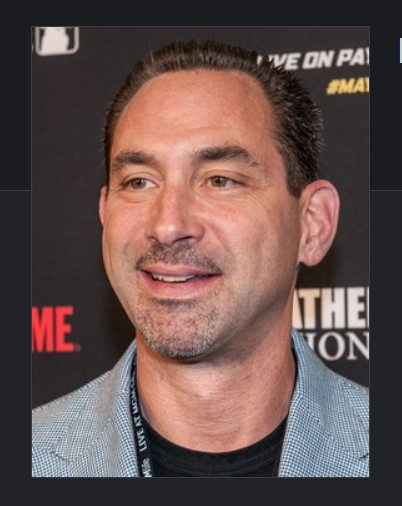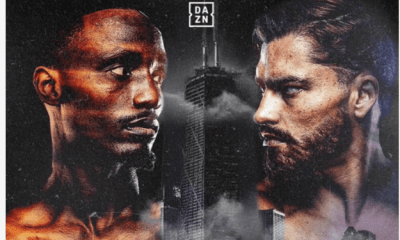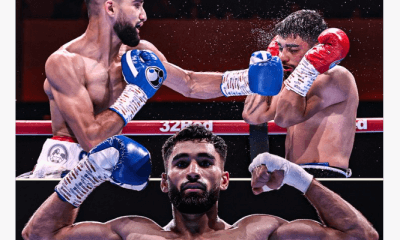Featured Articles
A Conversation With Acclaimed Journalist and Boxing Analyst Mark Kriegel

If you’re a storyteller, and Mark Kriegel is certainly that, then boxing is the perfect passport.
A multi-skilled journalist who works for ESPN on several platforms, Kriegel’s video essays for Top Rank promotions, which are fewer than 200 words, are popular, and sets the New York City native apart from the crowd.
“I do think when those essays work, I’m able to boil down the theme of the fight into something that’s really small,” he said. “I’ve learned more about writing in the last two years because of those essays than I had in the previous decade.”
Kriegel added: “It’s because of those essays and because they really force you to make choices and they force you to cut out whatever is extraneous,” he said. “If it doesn’t matter in the story line, it goes. I’ve never been able to be that ruthless with my own words until I started writing these essays. Learning how to write for television has given me more discipline than I’ve ever had before in terms of the word and selecting the right word.”
Because boxers are willing to speak with the media, their stories are often worth telling.
“Boxing is the most organic form of storytelling, even more than the theater. Boxers are more honest than most other athletes, even when they’re lying. Boxers generally remain accessible,” said Kriegel, who earned a bachelor’s degree from Swarthmore College and a master’s degree from Columbia University. “Fighters need the storytellers because there is no league. The fighter’s story is more important than his or her record or even his or her belts. The story is really what we’re tuning in for.”
The sweet science can be a sideshow, but it’s still usually compelling.
“There’s a lot not to like about boxing, but that’s also why it makes for great storytelling,” said Kriegel, a two-time New York Times bestselling author. “Some days I think it’s a sport. Some days I’m convinced it’s not a sport. Boxing is better for the storytellers than it is for the fighters. That’s a guilty confession.”
By the nature of boxing, there are two combatants in the ring and because of this, there is conflict.
While fans watch and journalists cover the sport, everyone wants to see who prevails, but it’s often the back story that seems to bring out the fans’ rapture.
Who doesn’t want to see a young man or woman battle his or her way out of a hardscrabble life and reach heights reserved for a chosen few?
“What makes for a good story is conflict. Boxing is formalized, ritualized conflict. It’s a staged, managed conflict. It’s elemental. It’s two guys basically naked in the ring going at each other,” said Kriegel, who began his career as a general assignment reporter for the Miami Herald and the New York Daily News where he was a finalist for the Pulitzer Prize in the Feature Writing category. “Because of the way it’s physically constructed, you’re going to see the nature of each character exposed. If you’re a storyteller, boxing does all the work for you.”
There is something pure and fundamental about boxing. “The other sports are metaphors for what boxing actually is and that’s combat. The difference between MMA and boxing, apart from the modes of combat, is that unlike MMA, boxing has a past,” Kriegel said. “It has a history. It’s a corrupt history, but it’s a very romantic one.”
It’s likely Kriegel came to be a writer because of his father, Leonard Kriegel, who is 88 and still lives in the same apartment on Eighth Avenue, two blocks from Madison Square Garden.
The elder Kriegel’s story is a remarkable one. Born in 1933, he was a polio victim at a young age, but this didn’t stop him from becoming an accomplished writer and teacher.
“My father is from the Bronx. He lost the use of his legs when he was 11 because of polio,” Kriegel said. “He’s a professor at City College. Most of his work and his teaching is American Literature. Which meant American male Literature. He was a very charismatic, crippled man writing about the nature of masculinity and it informed almost everything I’ve ever written.”
Kriegel is the author of four books including a novel, “Bless Me, Father,” which was based on a front-page column he wrote for the New York Post.
Esteemed writer Nick Tosches, who penned numerous books, had a hand in Kriegel’s development as an author.
“He wrote these fantastically stylized biographies,” Kriegel said of Tosches, who wrote about Jerry Lee Lewis, Dean Martin and Sonny Liston, to name but a few of his subjects.
Kriegel’s initial biography was published in 2004 and titled, “Namath: A Biography,” followed three years later by “Pistol: The Life Of Pete Maravich,” and five years later by “The Good Son: The Life Of Ray ‘Boom Boom’ Mancini.”
“I’d done a newspaper piece on Mancini in the [New York] Daily News. I owed the publisher a book on Michael Jordan, which I wasn’t too excited about doing, and this idea of Mancini kept coming back to me,” Kriegel said. “It wouldn’t leave me alone and I wouldn’t leave Ray alone.”
The book’s genesis took shape at an Italian restaurant in Santa Monica, California, with Kriegel, Mancini and the actor Ed O’Neill, eating and drinking until the small hours.
“Ray’s relationship with his father was more straightforward. He was out to redeem his father and that was beautiful,” Kriegel said. “There aren’t that many happy stories in boxing.”
Mancini promised his father, Lenny, a lightweight contender who was injured in World War II that he would win the championship he never did.
After scooping up the World Boxing Association lightweight belt in May 1982 from Arturo Frias, Mancini gave the belt to his father.
In a nationally televised title fight six months later at the outdoor ring at Caesars Palace, Mancini stopped Duk Koo Kim in the 14th round. The 27-year-old South Korean suffered a severe head injury and died five days later.
There are ups and downs in every person’s life, but it was extremely difficult for Mancini to accept what happened to Kim.
Though he retained his title and was pleased with that, Mancini said there was nothing good about that fight.
Three months after the November bout, Kim’s mother committed suicide because of what happened to her son and because family members were bickering over the money he earned.
Since time heals all wounds, Kim’s son, Kim Chi-Wan, eventually forgave Mancini, but it took nearly three decades.
It’s been said the 1980s was a Golden Era for boxing, and it was, but where does the current crop stand for Kriegel?
“There aren’t enough good fights. You can make an argument and it’s perfectly reasonable that the 1980s was [the Golden Era] because you had the Four Kings [Ray Leonard, Thomas Hearns, Roberto Duran and Marvin Hagler] and they fought each other,” he said. “[Muhammad] Ali and [Joe] Frazier fought their trilogy in far less time than it took [Manny] Pacquiao and [Floyd] Mayweather Jr. to get together for one. By the time they did, neither was in their prime.”
While there are outstanding boxers plying their trade right now, there are also problems.
“I really admire Mayweather a lot. One of the unfortunate byproducts of his era is the emphasis on the perfect record,” Kriegel noted. “To me a fighter’s career doesn’t become a truly dramatic proposition until he or she loses. The great plague on boxing right now is all these undefeated champions. I see a bunch of perfect records, but I don’t see many perfect fighters. The loss is what makes it dramatic.”
Kriegel said in an earlier time, Terence Crawford and Errol Spence Jr., both undefeated, would have fought each other multiple times and taken on all comers the way Oscar De La Hoya and the recently retired Shawn Porter did.
Pete Hamill, a national treasure, was Kriegel’s dear friend and mentor.
What does Kriegel take away from his time with Hamill, who passed away in August 2020?
“He made the idea of New York so romantic,” said Kriegel of Hamill, who was a journalist, writer, novelist and editor. “He made the idea of boxing romantic. He was a great and generous teacher. A really wonderful teacher. He was the kind of writer I wanted to become.”
Kriegel became a sportswriter by circumstance. “The [New York] Post turned me into a sports columnist out of desperation,” he said. “I never really took to becoming a sportswriter. I always felt ambivalent except when it was covering boxing. Boxing was the only sport I really loved covering and still do.”
It’s the elements in and around boxing that spark Kriegel’s imagination.
“The same stuff I loved about covering cops and criminals and courts, I found in boxing,” he pointed out. “I mean that you could actually find great moments of humanity. Boxing had all the stuff that I had been looking for. Thematically and in terms of content: fame and masculinity, good and evil. They’re all great dramas.”
Luckily, Kriegel found boxing and boxing found Kriegel. It’s a perfect match.
Check out more boxing news on video at the Boxing Channel
To comment on this story in the Fight Forum CLICK HERE
-

 Featured Articles4 weeks ago
Featured Articles4 weeks agoResults and Recaps from New York Where Taylor Edged Serrano Once Again
-

 Featured Articles2 weeks ago
Featured Articles2 weeks agoThe Hauser Report: Zayas-Garcia, Pacquiao, Usyk, and the NYSAC
-

 Featured Articles5 days ago
Featured Articles5 days agoOscar Duarte and Regis Prograis Prevail on an Action-Packed Fight Card in Chicago
-

 Featured Articles4 weeks ago
Featured Articles4 weeks agoResults and Recaps from NYC where Hamzah Sheeraz was Spectacular
-

 Featured Articles3 weeks ago
Featured Articles3 weeks agoManny Pacquiao and Mario Barrios Fight to a Draw; Fundora stops Tim Tszyu
-

 Featured Articles4 weeks ago
Featured Articles4 weeks agoPhiladelphia Welterweight Gil Turner, a Phenom, Now Rests in an Unmarked Grave
-

 Featured Articles2 weeks ago
Featured Articles2 weeks agoArne’s Almanac: Pacquiao-Barrios Redux
-

 Featured Articles1 week ago
Featured Articles1 week agoRemembering Dwight Muhammad Qawi (1953-2025) and his Triumphant Return to Prison


















